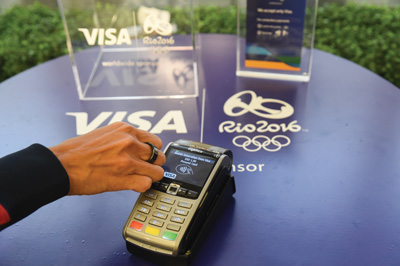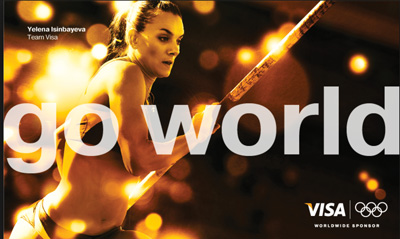Three decades ago, Visa first used its exclusive Olympic marketing rights to take market share from competitors. Later, it embraced soaring, majestic campaigns designed to bind the brand to the Games’ competitive spirit.
Now as mobile technology alters society’s understanding of credit and payments, Visa is again shifting gears on its Olympic strategy.
 |
After ads about bringing the world together in pursuit of gold (below), the new focus will be on things like the company’s first wearable.
Photo by: COURTESY OF VISA
|
Last week, Visa began an Olympic campaign far more practical and product-oriented than recent versions. At a New York City event with fencer Ibtihaj Muhammad, Visa unveiled a new tech-enabled ring that will allow users to pay with their Visa accounts just by tapping it at a specially equipped payment terminal.
All 45 athletes signed to Team Visa will be given the jewelry to wear in Rio, where Visa is installing 4,000 such point-of-sale devices.
 |
Please enter image description here.
Photo by: Enter Name Here |
The strategy is a response to the onslaught of payment innovations that still depend on Visa’s underlying network but threaten to diminish its ubiquitous plastic card, said Chris Curtin, Visa’s chief brand and innovation marketing officer. Consumers can expect to see more Visa ads and marketing centered on specific technologies, Visa’s role in powering those tools and how to use them.
“The concept of acceptance means much more than just point of sale today,” Curtin said.
“It means exposing what fundamentally is Visa, which is a network, [and] not just one form factor, which is a plastic card. It means opportunities to say Visa is as much a part of your watch today, or your phone, or your tablet, or your vehicle, or your Internet of Things, as it has been this plastic form factor for the last 40 to 50 years.”
Visa has been the official consumer payment system of the Olympics since 1986, and a 2015 Turnkey Sports poll of sports executives rated it as the Games’ best-known sponsor. With a history of aggressive and creative activation, Visa’s Olympic strategy is closely watched by the sports marketing world each cycle. Its current deal with the International Olympic Committee runs through 2020 and cost about $100 million per quadrennium when it was signed in 2009.
To be sure, Visa will continue to market its brand in the Olympics this year, signing a global stable of athletes to tell a story of worldwide acceptance and a “borderless world,” Curtin said. Visa has enlisted Raheleh Asemani, the first refugee athlete to qualify for the Games, to help tell that story.
But in an era of one-touch or no-touch commerce, the athletes also are expected to tell a product story. Last September, about 25 members of Team Visa visited corporate headquarters in San Francisco to be briefed on how Visa Checkout and Samsung Pay work; they also received a preview of futuristic services like biometric payments. Now, they’ll be sporting the company’s first wearable, the ring.
“It’s hard to imagine a category that has more transformation, more dynamic and kinetic energy in it than payments right now,” Curtin said. “Just in the business and the product side of things, this is a unique moment in time.”
But the product-oriented campaign is far more complicated to execute, said Zaileen Janmohamed, former head of Olympics management for Visa. Visa’s heralded “Go World” campaign, first rolled out in 2008 and expanded in 2012, was relatively simple to export and customize from market to market. But for a company that covers most of the world — Visa acquired Visa Europe in late 2015 — its precise product story differs in every market.
“Visa’s a global property, and the Olympics are a global platform,” said Janmohamed, who left Visa last month. “And in some places, it’s [near-field communication] enabled, it’s mobile, it’s chip and PIN, some countries have Visa Checkout, others don’t. It’s very complicated, whereas a brand ad is easy, right? You can make one and it probably can go in every single market. Maybe you change out the athlete.”
There’s little reason to believe the plastic card is truly endangered for the foreseeable future, Curtin said. But gradually, more and more consumers, particularly young ones, are paying without it. “As commerce changes and you no longer have a card to swipe, where does the product fit, and where does the brand fit? It’s a really interesting problem to solve,” Janmohamed said.
The 2016 Rio Games will be the first major event under the purview of new Visa Chief Marketing Officer Lynne Biggar, who joined nine months after predecessor Antonio Lucio left for Hewlett-Packard in April 2015.
IMG is handling all of Visa’s Olympic work after the company consolidated its sports marketing work under a single contractor in 2015. BBDO is developing its creative campaign. Curtin said the commercials will be a hybrid of traditional brand work and practical product illustration.
“We’re going to have creative that’s befitting of that stage,” Curtin said, “but it’s creative that begins to expose and portray a more comprehensive view of who Visa is.”





